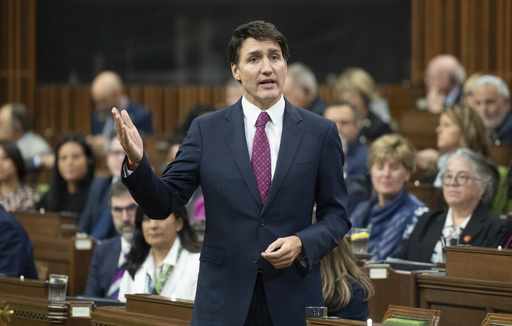
Toronto – Canada’s Deputy Prime Minister expressed her belief that Prime Minister Justin Trudeau retains majority support among Liberal members in Parliament, even as some party colleagues prepare to confront him in a bid to persuade him to resign.
Chrystia Freeland, along with several Cabinet members, publicly demonstrated their backing for Trudeau on Tuesday, just prior to a general meeting among party members. A faction of Liberals has circulated a letter aimed at persuading Trudeau to step down prior to the next election, although the exact number of signatories remains unclear.
Freeland stated, “The vast majority of Liberal Members of Parliament support the prime minister, support him as leader of our government, support him as leader of our party, and support him as the individual who will guide us into the next election.” She expressed increased confidence in this assertion following meetings over the last day and a half.
Recently, the Liberal Party encountered unexpected losses in special elections in historically secured districts, prompting questions about Trudeau’s leadership capabilities. The loss in Toronto, Canada’s largest city and a long-standing Liberal bastion, raises significant concerns about the party’s future.
Additionally, several Liberal MPs have announced they will not seek re-election. Trudeau has committed to leading the party into an election, which could occur anytime between fall and October 2025. Given that the Liberals do not hold a majority in the House of Commons, they must depend on the backing of at least one major parliamentary party.
Bloc Québécois Leader Yves-François Blanchet indicated that his party intends to collaborate with the Conservatives and the NDP to challenge the Liberals and possibly trigger an election if the government does not enhance old age security payments for seniors. “The whole story is now: what will Justin Trudeau, superstar, do in the coming days,” Blanchet remarked.
The Liberal Party, under Trudeau’s leadership since 2015, has faced growing frustrations from Canadians related to the rising cost of living in the aftermath of the COVID-19 pandemic. Trudeau’s government initially reestablished a liberal identity following nearly a decade of Conservative rule and boasts a legacy that includes immigration expansion, cannabis legalization, and the implementation of a carbon tax to combat climate change.
Employment Minister Randy Boissonnault stated, “Anyone who has ever wagered against Justin Trudeau has regretted that decision the next day.” However, the reality of dissent within the Cabinet has been acknowledged by some ministers. Labor Minister Stephen MacKinnon emphasized, “Whenever dissenting voices arise, we must address them and ensure we present a unified front to Canadians.”
Opposition Leader Pierre Poilievre criticized Trudeau, suggesting that the Prime Minister is preoccupied with internal struggles rather than effectively governing. “The reality is he can’t administer the government because he’s too busy fighting for his job after nine years,” Poilievre indicated.
Nelson Wiseman, a professor emeritus at the University of Toronto, claimed that the typical tenure for Canadian prime ministers has hovered around a decade over the past 75 years. “Trudeau’s time is up. Scandals throughout his administration have dulled his image. He often deflects or evades straightforward questions. There is a strong desire among Canadians for change, and many have tuned him out,” he stated.
He further added, “He was the leader who brought the Liberals back to power in 2015, but it isn’t 2015 anymore.” Trudeau’s father, Pierre Trudeau, rose to prominence in 1968 amid a wave of public enthusiasm dubbed “Trudeaumania” and governed Canada for nearly 16 years.
